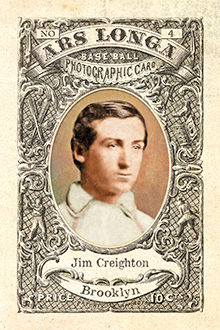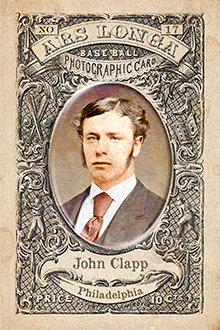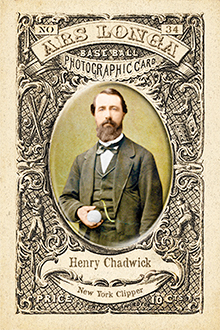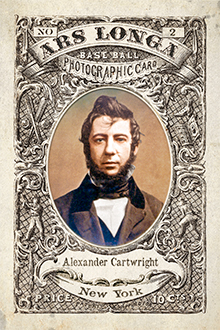- Series: Pioneer Portraits I: 1850-1874
- City: Brooklyn
- Team: Excelsiors
- League: National Association (NABBP)
James Creighton, Jr. (1841-1862) was a star pitcher for the Excelsior of Brooklyn from 1860-62. Widely regarded as the game’s 1st superstar and, perhaps, its 1st martyr. His unique pitching motion propelled him to fame, but his death from a ruptured hernia caused while hitting a home run gave this young man a place in the Pantheon of early greats.
- John Thorn, official historian of MLB, has called Creighton the “most important player not inducted into the Hall of Fame”
- Threw baseball’s 1st shutout: 11.8.1860
- In 1866 baseball made a small contribution to national reconciliation as the Washington Nationals came to Brooklyn for a match. Both clubs retired to the Creighton monument where, per the NY Times, “a silent tear was dropped to [his] memory…”
- Series: Pioneer Portraits I: 1850-1874
- City: Philadelphia
- Team: Athletics (NABBP)
- League: National Association (NAPBBP)
John Edgar Clapp (1851-1904) played for 8 teams and managed 6 over a 12 year span, beginning in the National Association with the Middletown Mansfields in 1872 and ending with the NY Gothams in ’83. Primarily a catcher, Clapp had a career BA of .283. With a lifetime 2,523 ABs, he struck out only 51 times.
- Was the first player-manager in major league history (1872)
- Jay Jaffe's JAWS system ranks John as the 88th best catcher in MLB history, just after Bubbles Hargrave and before Ed McFarland
- Earned the nickname “Honest John” after reporting a bookie’s attempted bribe to local police
- The 1881 bribe, in current dollars, amounted to @$119,000
- Fittingly, this Honest John entered police work after retirement from the game and died on the job in his hometown of Ithaca, NY
- Series: Pioneer Portraits I: 1850-1874
- City: New York
- Hall: National Baseball Hall of Fame
Henry Chadwick (1824-1908) is widely considered the “Father of Baseball” due to his profound influence on early public awareness of the game and upon its foundational rules. A journalist from Brooklyn, Chadwick was present at the creation as he saw the new game developing in the 1860s and began what would become sports reporting today.
- Literally wrote the book on baseball: Beadle’s Dime Base Ball Player in 1860
- Edited Spalding’s Official Base Ball Guide for decades
- Saw to it we don’t have tie games or one-bounce outfield put-outs today
- Elected to Hall of Fame: 1938
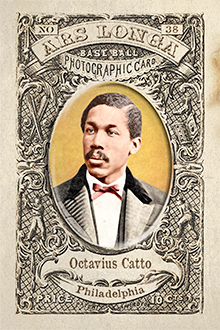
- Series: Pioneer Portraits I: 1850-1874
- City: Philadelphia
- Team: Pythian B.B.C.
- League: National Colored Baseball League
Octavius Valentine Catto (1839-1871) died a martyr for civil rights in Philadelphia amid violent Reconstruction Era political strife when he was shot three times and killed while on his way to vote. Only a few years before, he had been a pioneer in the early days of baseball as founder of the Pythian Base Ball Club in 1867. The emerging national game was shedding its elitist roots of pre-Civil War days and Catto was trying to make it a truly all-American sport. He sought membership for his club in the National Association and, in 1869, organized the first inter-racial match in Philadelphia versus the Olympic Ball Club. Catto had dedicated his life to the pursuit of freedom. He was an educator and mentor of black men, a military leader during the war, and ended his life in the forefront of the political struggle, including the integration of Philadelphia’s transit system. He brought to baseball the same passionate devotion that characterized his all-too-short life.
- The “gentlemen’s agreement” adopted by white baseball executives in response to Catto’s bid held sway – with very few exceptions – until 1947 when another talented infielder finally broke the color barrier
- Series: Pioneer Portraits I: 1850-1874
- City: New York
- Team: Knickerbockers
- Hall: National Baseball Hall of Fame
Alexander Joy Cartwright (1820-1892) was declared the inventor of baseball by an act of Congress in 1953. A founding member of the Knickerbocker Base Ball Club in 1842, Cartwright is oftentimes falsely credited with establishing the 9 player “diamond” format in 1845. Modern researchers have largely debunked the historical import of Cartwright’s influence upon the game, its rules and development during those early formative stages, citing a propagandizing campaign by Cartwright’s son as a primary source of myth-making.
- The Knickerbocker rules form the foundation of the modern game
- Thanks to such rules, runners are no longer “tagged out” via thrown balls
- The diamond’s dimensions were termed by Red Smith “the closest man has ever come to perfection.”
- Elected to Hall of Fame: 1938
